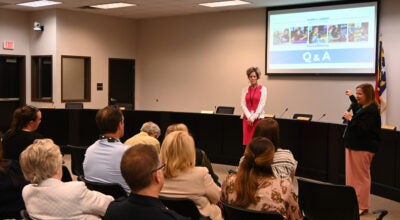Director: state budget a ‘mixed bag’
Published 12:00 am Sunday, July 28, 2013
SALISBURY — Rowan County could see millions less in future park and recreation investment funds after a state budget signed Friday gutted some trust fund programs, according to a local land trust executive.
Jason Walser, executive director of The LandTrust for Central North Carolina, said the budget nixed the Natural Heritage Trust Fund, repealed the North Carolina Conservation Tax Credit — which provided a steady stream of funding for several trust funds — and drastically cut funding for the Clean Water Management Trust Fund.
Still, Walser said, things could be worse.
“The good news is the Clean Water Management Trust Fund still exists,” Walser said. “It does have funding. It has funding to do new projects.”
But those projects aren’t likely to be of the same scale as in years past, Walser acknowledged.
And the county’s parks are likely to see a significant drop in LandTrust investments.
According to the 2011 Green Book — an annual report compiled by the statewide coalition Land for Tomorrow to update the current state of public conservation funding in North Carolina — Rowan County has seen roughly $11.3 million in trust funds granted since 1997.
The Parks and Recreation Trust Fund alone has gifted county parks with more than $1.6 million in development and improvement projects.
Since 1997, Rockwell Park, Cleveland Town Park, Salisbury Community Park, the Rowan Nature Center, Granite Lake Park, Dunn’s Mountain Park, Ellis Park and Foil Tatum Park are among the recreation areas that have seen seen help from the land trust.
“I would expect that in another 11 years, we will not be able to see $12 million in state investment and conservation in this county,” Walser said. “It will probably be a fraction of that.”
Many of the functions of the Natural Heritage Trust Fund will be assimilated into the Clean Water Management Trust Fund, Walser said, but the consolidation will still see funding cuts.
“In many ways, the budget for conservation was a mixed bag,” Walser said.
In 2008, the Clean Water fund had a budget of about $100 million. The same year the Natural Heritage fund had about $16.8 million, Walser said.
The consolidated trust fund budget will total $10.4 million statewide for the upcoming year.
The number of board members was also impacted. The boards had a combined 36 members prior to the budget. Those numbers have been pared down to nine members, which will be appointed by the North Carolina General Assembly, Walser said.
The budget also reroutes the deed stamp tax, which had been used as a dedicated revenue stream for the land trust, into the general fund. Those monies will be appropriated annually to the organization.
“I think one of the things that people in Rowan County and the surrounding continues have sort of taken for granted over the years — when there are was a need for the land trust to step up to the plate, we were there,” Walser said.
Citing a large tract purchase in Kannapolis 2005 and most recently the Spencer Woods purchase in 2011, Walser said the land trust has helped save valuable land for conservation.
“Without knowing we have substantial funding at the state level, I’m not sure we’ll be able to be there for the community in the same way that we have in the past and stick our neck out,” Walser said.
Despite receiving no state funding, legislators nixed the Uwharrie Regional Resources Commission, leaving organization members perplexed.
Max Walser, chairman of the commission, called the move “disheartening.”
“A high percentage of legislators didn’t know what was in the bill,” he said. “It was buried in a budget bill. What was so concerning to me about something like this is that there was no budget. We didn’t have a budget. The legislature didn’t give us one penny.”
Tucked away between line items on utilities commission fees and industrial commission fees is the sentence “Chapter 153C of the General Statutes is repealed.” It halted the all-volunteer group that was initially commissioned to review Alcoa’s relicensing proceedings and to explore the scenario of state-owned dams.
Max Walser said the organization discussed plenty of other avenues for economic development along the Yadkin River outside of the Alcoa debate.
“This commission still has important work to do, like trying to create jobs up and down the Yadkin, protecting our wonderful resources up and down the Yadkin River Basin, protecting this water source for my children and grandchildren for years to come,” he said. “That’s what’s disheartening to me. Due to petty politics, if nothing more, we lose an important commission.”
Moreover, cuts to the LandTrust funding could affect a tract of land along the Yadkin River that Alcoa’s relicensing settlement agreement would have been preserved as game lands.
Jason Walser, who also serves on the Uwharrie commission, said the agreement would allow for about 6,200 acres to be purchased at around $16.2 million for conservation — but if it isn’t bought during an allotted period it would be turned back over to Alcoa for sell, development or conservation.
“If that occurs as was proposed,” Jason Walser said of the agreement, “there’s a big chunk of land that we’ll have a few years to buy. I’m not sure how we’re going to pull that off. I don’t think we can raise $16.2 million on doughnut sales.”
Max Walser, the chair, said the funding cuts are worrisome for those looking to preserve the tract.
“We have not discussed that as a commission. I’m concerned about what’s going to happen to it,” he said of the acreage. “My guess is that some entity, some foundation, if it comes on the market, I would bet some coalition of groups would come together to get the land for public use. That’s my hope.”
Contact reporter Nathan Hardin at 704-797-4246.





